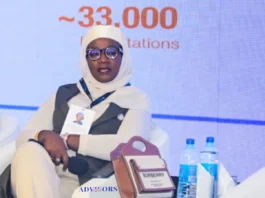By Ifeatu Agbu
As a precursor to the planned agricultural summit in the Niger Delta region, the Niger Delta Development Commission, NDDC, last week hosted stakeholders and agricultural experts in a strategic retreat to develop strategies to transform the region into Nigeria’s leading food hub.
The two-day strategic retreat, tagged “Niger Delta Critical Stakeholders’ Agenda Setting on Unlocking Agricultural Potential of the Region,” took place in Port Harcourt , with Commissioners of Agriculture and Permanent Secretaries from the nine Niger Delta states in attendance.
Addressing the gathering, the NDDC Managing Director, Dr Samuel Ogbuku, reaffirmed the Commission’s commitment to making the Niger Delta the nation’s food production hub through sustainable agricultural development and strong regional collaboration.
Ogbuku emphasised that agriculture remains the most reliable path to economic stability, peace, and food security in the region. He explained that the retreat provided stakeholders with an opportunity to exchange ideas and develop a unified strategy to ensure food sufficiency in the Niger Delta.
According to him, “We have the potential and comparative advantage in aquaculture. This is the time to make agriculture a central focus of the Renewed Hope Agenda. We must leave a lasting legacy for future generations.”
He recalled that before the discovery of crude oil, the people of the Niger Delta were predominantly farmers, and he noted that a return to agriculture would offer a more sustainable and inclusive economic future.
Ogbuku stated that the Commission is in discussions with the Origin Group to establish a regional food hub in the Niger Delta. The initiative aims to integrate agricultural value chains and promote large-scale food processing and export across the region.
The NDDC Executive Director of Projects, Dr Victor Antai, described the meeting as a “call to action,” urging stakeholders to take deliberate steps to drive agricultural transformation throughout the Niger Delta.
Antai affirmed: “Agriculture remains our surest path to inclusive growth, job creation, and food security. With vast arable land, rich waterways, and a resilient population, our region has all it takes to become Nigeria’s next agricultural powerhouse.”
He added that the retreat provided a platform to harmonise efforts among state governments, private investors, research institutions, and youth groups in pursuit of a coordinated agricultural development plan.
The Akwa Ibom State Commissioner for Agriculture, Dr Offiong Offor, highlighted her state’s comparative advantage in palm crop cultivation and oil production. She said the government was encouraging young people to venture into agriculture through training and empowerment programs.
Similarly, the Bayelsa State Commissioner for Agriculture, Prof. Tubokiye Sese, reaffirmed his state’s commitment to achieving food security. He noted that the state government was supporting farmers with seedlings, farm equipment, and free land-clearing services to improve productivity and ensure citizens have access to safe and sufficient food.
In her remarks, the NDDC Director of Agriculture and Fisheries, Dr Winifred Madume, reiterated the Commission’s dedication to conceptualising, planning, and implementing sustainable agricultural and fisheries development programs across the Niger Delta.
Part of the outcome of the retreat was an endorsement of the plan to hold an agricultural summit for the Niger Delta region in line with President Bola Ahmed Tinubu administration’s agrarian programme.
It was agreed that the retreat would be put together in conjunction with the state governments in the region.
Reflecting on the Federal Government’s agricultural programmes, Ogbuku stressed the need to bring them home to the Niger Delta region, noting that the NDDC has continued to promote policies and programmes that enhance food security and poverty reduction in the states under its purview.
The NDDC Boss recalled that last year, the Commission trained 200 women and youths in Livestock Farming and Agro-Processing at Okiemutie Farms in Eku, Amukpe, Sapele Local Government Area of Delta State.
Ogbuku noted that the Commission was partnering with the International Fund for Agricultural Development (IFAD) to provide apprenticeship programmes for residents of the Niger Delta region.
The NDDC and IFAD had launched the Livelihood Improvement Family Enterprises, LIFE-ND Project as part of efforts to boost food security in Nigeria’s oil-rich region.
The agricultural programme, which seeks to enhance income, food security and job creation for rural youth and women through sustainable agrarian enterprises in the Niger Delta region, aligns with the efforts of President Tinubu’s administration, which had declared a state of emergency on agriculture.
The $90 million LIFE-ND programme, jointly financed by IFAD, the Federal Government, and the NDDC, promotes projects that will shift Niger Deltans away from subsistence farming into commercial and sustainable agriculture, thereby enhancing the income and livelihoods of youths in the region.
Ogbuku said that the project is breaking new ground and cultivating opportunities for wealth and stability, noting that it would transform the lives of over 38,000 direct beneficiaries, with its multiplier effects touching many more people across the Niger Delta region.
Indeed, the partnership between NDDC and IFAD is a vigorous vine and one that will continue to grow and bear fruit. With IFAD’s US$60 million investment and NDDC’s US$30 million contribution, the ground has been watered and fertilised for a brighter future.
It is noteworthy that the NDDC has fulfilled its financial obligations for this laudable project, which directly supports the Federal Government’s agricultural policy and the strategic framework for youth employment and job creation.
Indeed, the Life-ND project stands as a beacon of hope and progress for youth because it addresses the challenges our communities face in harnessing opportunities for growth and development.
Already, it is yielding harvests in various crop production sectors. In November 2024, the NDDC celebrated a ground breaking rice harvest under its Rice and Cassava Farmers Empowerment Programme in Warrake, a food-producing area in the Owan East Local Government Area of Edo State.
The trail-blazing harvest in Warrake shows the gains of leveraging the agricultural potential of the Niger Delta region and promoting the shift from traditional to mechanised farming methods.
The Warrake farm’s success is significant because it adopted complete mechanisation from land preparation to harvesting and good agronomic practices. It is also good to see that the seasons are not stopping the programme as work continues even into the short dry season in the region.
This programme promises to ensure that the Niger Delta region regains its status as the leading light in agriculture, especially in rice and cassava farming.
What has been achieved at the Warrake rice farm confirms the readiness of the NDDC to revitalise agricultural development in the Niger Delta region.
Recall that earlier in the year, the NDDC entered into a partnership with the Rice Farmers Association of Nigeria, RIFAN, as part of its efforts to ensure food security in the Niger Delta region.
As the Niger Delta moves away from the oil economy, the sector that can accommodate our youths in large numbers is agriculture. It is also heartwarming that we are transitioning from subsistence agriculture to mechanised farming to harness the opportunities the Niger Delta region offers.
The Niger Delta region, because of its arable wetlands, rainfall, and other ecological factors, provides a window for planting rice at least twice during a farming season.
By embracing rice and cassava farming, the NDDC demonstrates that sufficient local food production is possible in the country. The Commission is setting the pace on getting the Niger Delta region to feed Nigeria and contribute to the President’s agenda of self-sufficiency in food production.








